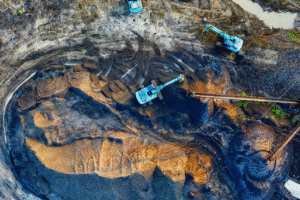 India has set its sights on two bold and interconnected national objectives: achieving Viksit Bharat (Developed India) status by 2047 and reaching Net Zero carbon emissions by 2070. Meeting these goals will require maintaining high economic growth rates, ensuring long-term energy security, and significantly expanding renewable energy infrastructure. However, with coal currently generating over 70% of the country’s electricity, phasing down thermal coal presents a major challenge that must be addressed without compromising development priorities.
India has set its sights on two bold and interconnected national objectives: achieving Viksit Bharat (Developed India) status by 2047 and reaching Net Zero carbon emissions by 2070. Meeting these goals will require maintaining high economic growth rates, ensuring long-term energy security, and significantly expanding renewable energy infrastructure. However, with coal currently generating over 70% of the country’s electricity, phasing down thermal coal presents a major challenge that must be addressed without compromising development priorities.
The Ashoka Centre for a People-centric Energy Transition (ACPET) at Ashoka University is actively exploring these complex issues through its Energy Futures Lab. The lab has developed advanced tools—including an in-house AI/ML-backed Coal Economy Model and an Energy Chatbot—to analyze the future of India’s coal usage. Insights from this modelling indicate that under both current and anticipated scenarios, a meaningful coal phase-down in India is unlikely before 2047 if the country intends to meet its Viksit Bharat aspirations.
Against this backdrop, ACPET is organizing a national workshop designed to explore the difficult trade-offs and potential pathways at the intersection of economic growth, energy access, and climate commitments. The workshop will provide a platform for diverse stakeholders to engage in evidence-based discussions on how to achieve a “just and people-centric transition.”
The workshop will consist of three main segments:
-
Opening Session: Featuring keynote addresses from senior policymakers and prominent energy experts.
-
Session I: Focused on the macroeconomic implications of coal transition within the Viksit Bharat and Net Zero policy frameworks.
-
Session II: A roundtable discussion on critical policy and implementation areas, including electricity demand, infrastructure for coal and renewables, and welfare measures for coal-reliant communities.
The workshop aims to:
-
Share insights from ACPET’s modelling on future coal demand, electricity needs, and renewable energy growth.
-
Initiate dialogue on practical timelines and strategies for a meaningful coal phase-down.
-
Generate actionable policy recommendations for a just transition that protects jobs, supports reskilling, and promotes social welfare in coal-dependent regions.
-
Inform national energy policy with evidence-based analysis that balances climate responsibility with economic and energy imperatives.
This multi-stakeholder event will bring together representatives from:
-
Academia and Research: Including energy economists, climate researchers, and policy analysts.
-
Government and Regulatory Bodies: Senior officials from ministries of energy, coal, and related agencies.
-
Industry: Experts in electricity demand, renewable capacity, and coal transition strategies.
-
Civil Society and Practitioners: Advocates focused on community welfare, just transitions, and skill development.
Notable speakers include Dr. Anil Kumar Jain, Chairperson of the Petroleum and Natural Gas Regulatory Board (PNGRB), along with researchers and experts from ACPET, CEA, TERI, WRI, Prayas, CEEW, and other leading institutions.
The Ashoka Centre for a People-centric Energy Transition (ACPET) is a transdisciplinary research hub at Ashoka University, committed to promoting equitable, sustainable, and inclusive energy transitions across India and the Global South. ACPET tackles critical knowledge gaps by developing innovative frameworks in areas like renewable electrification, circular economy strategies, and community-first transition models—ensuring that people, livelihoods, and the environment remain at the heart of energy planning.

